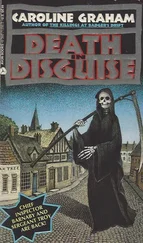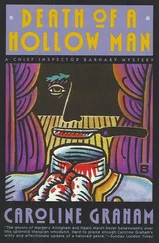“Did any of you notice any change in Mr. Brinkley? Did he seem worried about anything in particular?”
Everyone shook his or her head, though Barnaby noticed Leo Fortune frowning to himself.
“Are you permanently on reception?” he asked the middle-aged woman who had let them in. She nodded. “Could you tell me if anyone called to visit him that you hadn’t seen before? A new client, perhaps?”
“No.”
“What about phone calls? Was anyone especially persistent? Not, necessarily a business client.”
“I can assure you,” she flushed angrily, “I’ve better things to do with my time than listen in to other people’s conversations.”
Barnaby widened his interrogation somewhat, asking how the death of their employer might affect the staff. Would all their jobs remain secure, for example?
At this the mood changed. People looked at each other a touch mistily. Smiled and nodded. Leo Fortune spoke for them all. Barnaby offered his congratulations, noting that here were seven neat little motives and no mistake. Some doubtless stronger than others. Perhaps he had been a touch too quick to dismiss the present company. He got up from his perch on the corner of a desk and nodded at the busily scribbling figure of his assistant.
“Sergeant Troy will take your names and addresses. And those of any members of staff who are away.” He raised his eyebrows, nodding towards Fortune’s glassed-off enclosure.
The man left the group, followed the chief inspector, sat down behind his desk and said, “No, I didn’t.”
“You anticipate me, Mr. Fortune.”
“None of us knew about the will. We were all knocked sideways. There were a lot of tears the day the solicitor came. And they weren’t just tears of gratitude.”
“You have been here…?”
“The longest. Twenty-four years.”
“So presumably you have taken over Mr. Brinkley’s clients?”
“Yes. He didn’t have many but what he had were choice.”
“Which means?”
“Stonking rich.”
“Do you know any of them? Or are you going in cold, as it were?”
“I’m familiar with the accounts, of course. They were our most important, so someone other than Dennis had to be. Not that he was ever ill.”
“And the other partner?”
“Latham?” He gave a shout of what appeared quite genuine laughter. “He’s pathetic. His father-in-law bought into the business, apparently to get him from under his wife’s feet. The man can hardly use a computer.”
“So what does he do all day?”
“Smokes, drinks, walks about, reads the paper. Disappears for long periods.”
“And he gets a salary for that?”
“No. Gilda – that’s his wife – gives him hand-outs. When she thinks he deserves it.”
“What about clients?”
“Hasn’t any. He inherited a few from old man Fallon but they all decamped. Some to myself. Others just left.”
“And his share of the company?”
“Her share. Forty-nine per cent.” He beamed with satisfaction, showing sharp white teeth. “So we’ll always have the edge.”
“I’d better take his address and phone number.”
As Leo Fortune scrawled this down he said, “By the way, the night Dennis died I was playing David Bliss in Hay Fever. ” He handed the sheet of paper over. “Amdram, you know.”
“Yes,” said Barnaby. He remembered his daughter at Cambridge. John Webster at the ADC. Amdram with a vengeance. The stage alight.
“Why did you ask us about going out during the day? The papers said Dennis died in the early evening.”
“That’s true. But the apparatus that killed him was set up before he arrived home.”
Fortune looked puzzled at the word “apparatus.” Barnaby explained in precise detail what had happened and straightaway regretted it.
“Christ…how absolutely…” Fortune then turned an interesting pale green and began to slip from his chair.
Five minutes later the two policemen were out in the street. They did not leave in good odour. Someone was pushing Leo’s head between his knees while someone else, directing a deeply reproachful glance in the chief inspector’s direction, rushed past with a glass of water.
The others had gathered around Belinda. The beautiful Belinda, just married, deeply in love and newly pregnant was shrilly holding forth while tossing her curls about. Of all the bloody cheek was her gist. And her with a ring on and everything. All those who weren’t already giving Barnaby a hard stare went to work on Sergeant Troy.
“Anyone’d think,” he said, now sulking outside on the pavement, “I’d asked her how much for a blow job.”
“What did you ask her?”
“Would she like a drink after work? What’s so terrible about that?” Troy started savagely kicking a hamburger box in the gutter. “I thought we were supposed to be living in the twenty-first century.”
“Only just.”
“I should have remembered my stars.” Troy, always prepared to assign to fate what he refused to concede to self-awareness, developed his theme. “Maureen read them over breakfast. ‘Any desire for intimacy is way off scale this week.’”
“Maybe that was just wishful thinking on her part?”
“No.” Troy, missing the point, bowed to the inevitable. “Apparently Orion’s on the cusp.”
“You’ll be on the cusp any minute now if you don’t stop kicking that bloody box about.”
Barnaby was halfway through an excellent steak pie and buttered carrots in the canteen when the desk let him know that Mrs. Crudge had arrived.
“Off you go, Sergeant.”
“Sir?”
“Look after her, see her through the system, take her to my office. Sort some tea. The usual stuff.”
Troy watched the chief chomping away, then looked down at his own plate. At the fine piece of succulent haddock, potato croquettes and mushy peas. Not much point in asking them to put it in the oven. Once he’d left the table that was it. No wonder he was so thin. He thought, I’m fading away. They’ll be sorry when I’m gone.
Barnaby finished his meal. For a shameful moment he toyed with the idea of eating Troy’s fish. Excusing such a gluttonous impulse by wondering what might be waiting for him that night at Arbury Crescent and fantasising going to bed hungry, something he had never done in his life. He hurried away before greed could get the better of him.
“Look at this mess.” Mrs. Crudge waggled stained fingers in the air. “That stuff they give you to wipe it off wouldn’t clean a mouse’s bottom.”
“Sorry about that. Thank you for coming—”
“What d’you want my fingerprints for anyway?”
“Elimination,” explained Barnaby. “How did the—”
“Nobody believes this. You should have heard them in the post office. Murder – in Forbes Abbot!”
People were always saying such things to the chief inspector. And with exactly that mingling of shock and indignation. It was as if their special patch had been granted divine exemption from such nastiness and the Almighty had done a runner on the deal.
Sergeant Troy opened the interview by asking if he could take one or two details from Mrs. Crudge, starting with her Christian name.
“I gave all that to them what come to the house. I’m not going through it again.”
“Not to worry,” said Barnaby. “First, could you tell me how long you’ve been employed by Mr. Brinkley?”
“Since he moved to the village, so that’s over twenty years. But the office job, nearer five. After their last cleaner retired.”
“He was easy to work for?”
“A lovely man. Straight as a die. And courtesy itself. Mind you, he was very particular.”
“In what way?”
“Things had to be just so. Take ornaments – I had to put them back precisely in their place. A fraction of an inch out and he’d know. And any bit of a ruck in a cushion or curtain he’d be there, smoothing it out.”
Читать дальше










